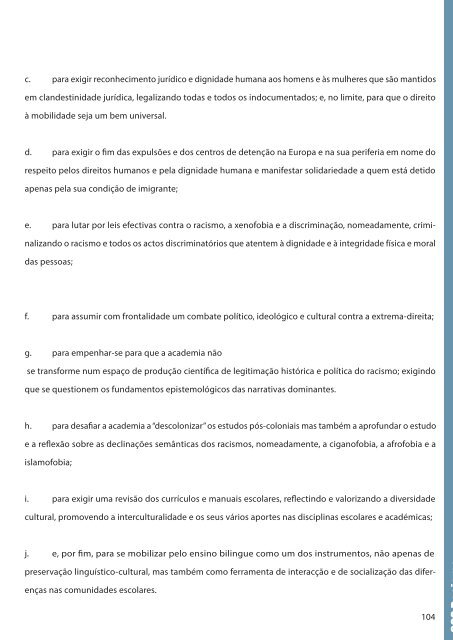cartas a @ s europe @ s cartas al europe letterstotheeuropeans
cartas a @ s europe @ s cartas al europe letterstotheeuropeans
cartas a @ s europe @ s cartas al europe letterstotheeuropeans
Create successful ePaper yourself
Turn your PDF publications into a flip-book with our unique Google optimized e-Paper software.
c. para exigir reconhecimento jurídico e dignidade humana aos homens e às mulheres que são mantidos<br />
em clandestinidade jurídica, leg<strong>al</strong>izando todas e todos os indocumentados; e, no limite, para que o direito<br />
à mobilidade seja um bem univers<strong>al</strong>.<br />
d. para exigir o fim das expulsões e dos centros de detenção na Europa e na sua periferia em nome do<br />
respeito pelos direitos humanos e pela dignidade humana e manifestar solidariedade a quem está detido<br />
apenas pela sua condição de imigrante;<br />
e. para lutar por leis efectivas contra o racismo, a xenofobia e a discriminação, nomeadamente, crimi-<br />
n<strong>al</strong>izando o racismo e todos os actos discriminatórios que atentem à dignidade e à integridade física e mor<strong>al</strong><br />
das pessoas;<br />
f. para assumir com front<strong>al</strong>idade um combate político, ideológico e cultur<strong>al</strong> contra a extrema-direita;<br />
g. para empenhar-se para que a academia não<br />
se transforme num espaço de produção científica de legitimação histórica e política do racismo; exigindo<br />
que se questionem os fundamentos epistemológicos das narrativas dominantes.<br />
h. para desafiar a academia a “descolonizar” os estudos pós-coloniais mas também a aprofundar o estudo<br />
e a reflexão sobre as declinações semânticas dos racismos, nomeadamente, a ciganofobia, a afrofobia e a<br />
islamofobia;<br />
i. para exigir uma revisão dos currículos e manuais escolares, reflectindo e v<strong>al</strong>orizando a diversidade<br />
cultur<strong>al</strong>, promovendo a intercultur<strong>al</strong>idade e os seus vários aportes nas disciplinas escolares e académicas;<br />
j. e, por fim, para se mobilizar pelo ensino bilingue como um dos instrumentos, não apenas de<br />
preservação linguístico-cultur<strong>al</strong>, mas também como ferramenta de interacção e de soci<strong>al</strong>ização das difer-<br />
enças nas comunidades escolares.<br />
104<br />
SOS Racismo<br />
c. to demand leg<strong>al</strong> recognition and human dignity for men and women who are kept in leg<strong>al</strong> clandes-<br />
tinity, regularising the status of everyone without documents and, ultimately, to demand that the right to<br />
mobility becomes univers<strong>al</strong>.<br />
d. to demand an end to expulsions and detention centres in Europe and its periphery in the respect for<br />
human rights and human dignity and to show solidarity with those who are detained solely on account of<br />
their status as immigrants;<br />
e. to struggle for effective laws against racism, xenophobia and discrimination, namely by crimin<strong>al</strong>ising<br />
racism and <strong>al</strong>l acts of discrimination directed against the dignity and the physic<strong>al</strong> and mor<strong>al</strong> integrity of<br />
individu<strong>al</strong>s;<br />
f. to clearly commit to a politic<strong>al</strong>, ideologic<strong>al</strong> and cultur<strong>al</strong> fight against the far-right;<br />
g. to strive to ensure that academia is not transformed into a space for the scientific production of<br />
historic<strong>al</strong> and politic<strong>al</strong> legitimations of racism, demanding that the epistemologic<strong>al</strong> basis of dominant narra-<br />
tives is questioned.<br />
h. to ch<strong>al</strong>lenge academia to “decolonise” post-coloni<strong>al</strong> studies and <strong>al</strong>so to deepen research and reflexion<br />
on the semantic declensions of racisms, namely romaphobia, afrophobia and islamophobia;<br />
i. to demand a review of curricula and school textbooks, to ensure that they reflect and v<strong>al</strong>ue cultur<strong>al</strong><br />
diversity and promote intercultur<strong>al</strong>ity and its various contributions in school and academic subjects;<br />
j. fin<strong>al</strong>ly, to mobilise in support of bilingu<strong>al</strong> teaching as one of the instruments that not only ensures<br />
linguistic-cultur<strong>al</strong> preservation but is <strong>al</strong>so a tool for interaction and soci<strong>al</strong>isation of differences in school<br />
communities.<br />
105


